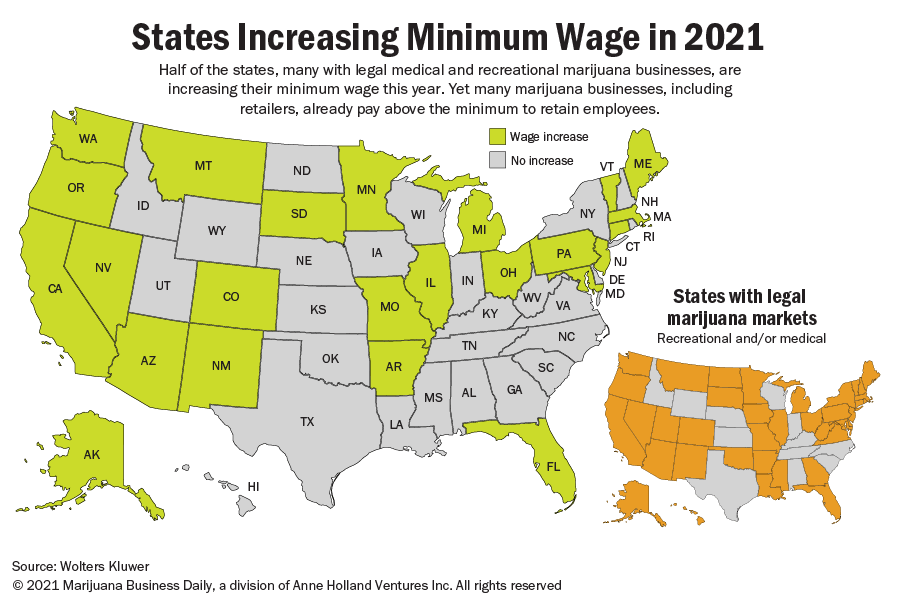Half the states across the country have increased – or will raise – the minimum wage paid to hourly workers this year, but many cannabis businesses, including retailers, are unlikely to feel much of an impact.
That’s because most say they already pay their employees above the minimum wage set by the states in which they operate.
Moreover, that pay is in addition to attractive benefit packages.
Such compensation packages stand in contrast to small mainstream businesses that are concerned over the impact of a pay hike amid the economic fallout from the coronavirus pandemic.
Higher pay and benefits appear to have become the norm in the cannabis industry, where it’s important to retain knowledgeable employees such as budtenders who serve marijuana customers.
Nationwide, budtenders earn an average of $15 an hour, according to the “2020 Cannabis Industry Salary Guide” published by Vangst, a Denver-based cannabis staffing firm.
Of the companies surveyed, 90% offer some form of benefits package that often includes health insurance, paid time off, a 401(k) plan or equity in the business.
Some also throw in a cell phone and commuter allowances.
“It’s the right thing to do, and it’s competitive to get great talent,” Vangst founder and CEO Karson Humiston said. “If you’re running a business, you have an obligation to figure out how to pay your staff livable wages.
“Generally, we believe that if you are an employee and you’re working 40 hours a week, you should make enough money to lead a decent life.”
California on top
Among states, California has the highest minimum wage: $14 an hour, although that applies to businesses with at least 26 employees.
As of Jan. 1, the California city of Emeryville had the highest minimum wage rate in the country, at $16.84 per hour, followed by Seattle at $16.69, according to Wolters Kluwer, an information services company with headquarters in Philadelphia and the Netherlands.
Because most cannabis companies already are paying above the minimum wage, they don’t have to factor minimum wage increases into their plans for 2021, said Nichole Upshaw, executive vice president of human resources for Jushi Holdings, a Boca Raton, Florida-based multistate operator and owner of cannabis retail, cultivation and processing licenses.
“Cannabis has been doing it right from the start,” Upshaw said. “Other industries ask, ‘How low can we go? What do we have to pay?’
“Cannabis asks the question, ‘What can we pay?’ We’re already there and we don’t have to work it into our plan.”
Jushi, which early on offered employees who interact with the public hazard pay for taking the risk during the COVID-19 pandemic, must navigate varying minimum-wage increases in most of the five states where it operates: California, Illinois, Ohio, Pennsylvania and Virginia.
While none of those states this year will reach the $15 an hour minimum that President Joe Biden envisions for all federal government employees, they are headed in that direction.
As the minimum wage in those states rises, Jushi is considering pay raises commensurate with those increases.
Mainstream retailers eye $15
Businesses in the mainstream retail sector, meanwhile, also have taken note of the $15 minimum wage. Last June, Target announced it would raise its starting wage for all U.S. employees to $15 an hour.
In September, Walmart announced it was giving a pay raise to 165,000 employees. Many saw their hourly wage increase from $11 to $15 or more.
Upshaw believes it’s critical that cannabis businesses are competitive with those companies.
“Everybody is making this move toward $15 an hour,” she added. “People started realizing they needed to inch toward that.”
In Michigan, where the hourly minimum wage is $9.65, Troy-based Gage Cannabis doesn’t pay anyone less than $13 an hour, and most of the vertically integrated business’ employees earn $16-$18 an hour, company President Fabian Monaco said.
“The majority of our people are already above that amount, but to stay competitive, we’ll probably see a commensurate pay increase,” Monaco said.
“We’ll evaluate that when the time comes. It’s a tough job, especially at a retail location.”
In addition to paying above minimum wage, Gage provides most hourly employees a $75 bonus every other week for their work during the pandemic.
Gage, which employs nearly 300 people, expects its staff to double by the end of the year as it opens more dispensaries.
The company, which currently has six retail locations, expects it will have a total of 20 by the end of 2021.
Gage employs up to 25 people at each of the company’s retail locations, which currently offer customers only curbside pickup.
A career versus a job
Compensation packages at Phoenix-based Tilt Holdings, which has a portfolio of cannabis businesses that provide technology, hardware, cultivation and production, are designed to encourage employees to choose the cannabis industry as a career, rather than just a job, said Gary Santo, the company’s president.
Tilt pays above minimum wage in every state in which it operates. It also offers health and life insurance as well as disability pay for employees who work at least 30 hours a week.
The company, which employs about 300 people, offers extensive training and helps employees figure out how to develop their careers. There’s also a stock-option program.
“We love our people to be invested in us,” Santo said. “The easiest way to have them act like an owner is to have them be an owner.”
In Oregon, the minimum wage varies depending on which part of the state a business is located, making it challenging to set a standard rate for all employees if a cannabis retailer has stores in multiple locations, said Kevin Hogan, co-founder and president of Bend-based Oregrown.
The minimum wage in Bend and Cannon Beach, where two of Oregrown’s stores are located, is currently $12 an hour and set to increase to $12.75 on July 1. In Portland, where the company operates a third store, it’s $13.25, though the rate in the Portland metro area is scheduled to go to $14 on July 1.
Oregrown, however, pays well above the minimum wage, with some of its budtenders making more than $25 an hour.
Hogan estimates that about a third of Oregrown’s employees participate in the company’s stock-ownership program, and health insurance is offered to some hourly employees.
The company is considering including all employees in its health-care coverage as well as offering paid time off.
“Experience is big for us, so we make sure we’ve got an incentive program that attracts the best sales associates in the state,” Hogan said.







